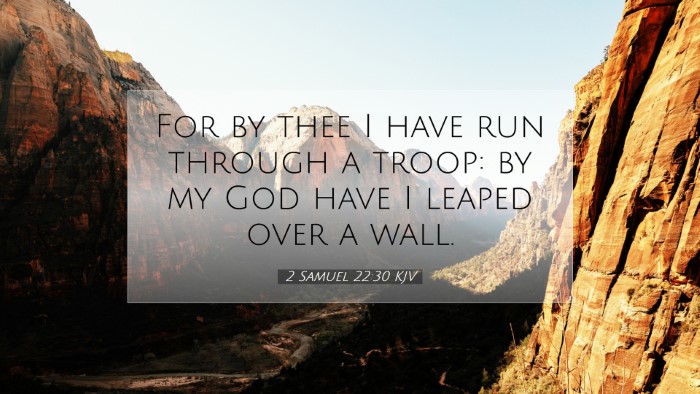Commentary on 2 Samuel 22:30
Bible Verse: "For by thee I have run through a troop: by my God have I leaped over a wall." (2 Samuel 22:30, KJV)
Introduction
This verse is part of David's song of deliverance (2 Samuel 22), where he recounts God's faithfulness and power in his life. It captures the essence of divine empowerment, proclaiming the strength that comes through faith in God. Scholars such as Matthew Henry, Albert Barnes, and Adam Clarke provide rich insights into the theological and practical implications of this verse.
Thematic Analysis
The overarching theme in this verse is divine assistance and victory through faith. David expresses how his achievements in battle are not solely based on his own strength but are attributed to the empowering presence of God.
-
Divine Empowerment:
David acknowledges that it is God who enables him to overcome obstacles. The phrase "run through a troop" indicates swift victory over many adversaries, while "leaped over a wall" signifies overcoming barriers that seem insurmountable.
-
Trust in God:
This verse underscores the importance of trusting in God's power. David's experiences serve as a testament to the belief that faith can enable believers to accomplish the impossible.
Exegetical Insights
Examining the original Hebrew can enrich one's understanding of the text. The words used convey a sense of urgency and dynamism. The imagery evokes a warrior's fervor as he engages in conflict:
-
Troop (גַּיִס, gāyis):
This term refers to a band of soldiers or a multitude of foes. David's assertion of running through them illustrates his fearless approach, reinforced by divine strength.
-
Wall (חֵי, hāyi):
The wall symbolizes barriers or challenges that obstruct success. The act of leaping suggests not just overcoming but a triumphant approach to adversity.
Commentary from Public Domain Sources
Matthew Henry: Henry emphasizes the significance of God's help in times of trouble. He notes that believers often encounter difficulties that seem overwhelming, yet with faith, they can triumph. He describes David's confidence as a model for those facing their "troops" or barriers, highlighting the necessity of divine intervention in achieving success.
Albert Barnes: Barnes expounds on the military imagery of the verse. He suggests that David's success in battle is a metaphor for spiritual victories. Just as David conquered physical foes, believers are called to engage in spiritual warfare, relying on God's strength to "run through" trials and "leap over" obstacles in their lives.
Adam Clarke: Clarke points out that this verse encapsulates the essence of the Christian experience—struggles followed by divine deliverance. He suggests that the phrase implies a dynamic and ongoing relationship with God, where His power enables believers to achieve great feats that go beyond human capability.
Theological Implications
This verse raises significant theological themes worth contemplating:
-
Human Limitation vs. Divine Capability:
The acknowledgment of divine help counters human pride, reminding believers that victories are not solely earned through individual effort but through collaboration with God's power.
-
Faith's Role in Action:
David's running and leaping are actions taken in faith, illustrating that while God empowers us, proactive faith is necessary to actualize divine potential in our lives. This participation is key for spiritual growth and maturity.
Practical Application
The insights gleaned from 2 Samuel 22:30 provide valuable lessons for pastors, students, and theologians alike:
-
Encouragement in Ministry:
Pastors can draw strength from this verse, reminding congregants that God equips them to face their challenges, whether personal, communal, or societal.
-
Developing a Faith-Focused Approach:
Theologians and students are encouraged to explore how faith can inspire action, promoting a belief that God’s involvement in their decision-making can lead to transformative outcomes.
Conclusion
In conclusion, 2 Samuel 22:30 serves as a profound reminder of the empowerment believers receive through their relationship with God. The insights from public domain commentaries deepen our understanding of this text and challenge Christians to embrace a life of faith that actively engages with the divine. As David demonstrated, reliance on God can lead to remarkable victories, enabling us to run through troops and leap over walls.


